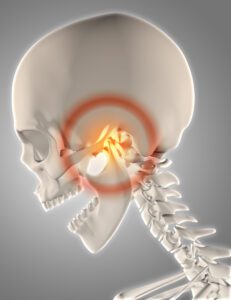The temporomandibular joint (TMJ) is complex, bilateral joint on each side of your face. Located just in front of your ears, it connects your jawbone to your skull and is responsible for many movements. We are able to perform essential functions such as chewing food, talking, laughing, yawning, and making facial expressions because of these joints.
The TMJ is comprised of muscles, ligaments, and discs that help you make these movements with ease. However, if you suffer from a problem with these joints, it can be very painful. The team at Flower Mound Dental offers TMJ treatment in Flower Mound, TX for patients who suffer from painful TMJ symptoms.

What Is a TMJ Disorder?
A TMJ disorder, or TMD, actually refers to a whole range of problems that affect the TMJ and the muscles surrounding it. This type of disorder can lead to painful TMJ symptoms including jaw pain that can interfere with your everyday life.
TMJ Symptoms
The severity of a TMJ disorder will vary from patient to patient. However, the signs and symptoms are typically the same. Common indicators of a problem with your TMJ include:
- Jaw Pain and Discomfort: Most people who are diagnosed with TMD will experience jaw pain. It is typically the first sign that there is a problem. This pain can radiate to the face, neck, and even the shoulders.
- Limited Jaw Movement: Some patients with a TMJ disorder find it difficult to open or close their mouth fully. They may notice clicking, popping, or a grinding sound when moving their jaw.
- Headaches: Frequent headaches, often resembling tension headaches, are also a common symptom of TMD.
- Jaw Muscle Stiffness: The muscles around the jaw can feel tight or stiff, especially in the morning or after extended periods of talking or chewing.
- Facial Pain: Pain or tenderness that is localized on the side of the face by the joints is a common sign of a TMJ disorder.
- Lockjaw: In the most severe cases of TMD, patients will be unable to move their jaw and it will be locked in one position.
- Difficulty Chewing: Most people who experience a TMJ disorder will find it hard or painful to chew food or their bite will feel unaligned.
TMJ Treatment in Flower Mound, TX
Oral Splints or Mouthguards: An oral splint is a tool that dentists use to help patients who suffer from teeth grinding, a common cause and/or symptom of TMJ disorders. It is also referred to as a nightguard or a dental oral appliance.
You will wear this at night while you sleep to protect your teeth and help take the tension off of your jaw joints. It will hold your jaw in the proper positon while you sleep. Each TMJ mouthguard is custom-made from impressions and will fit snuggly in your mouth.
Bite Alignment: If your teeth are crooked or out of alignment, then you may benefit from orthodontic treatment or dental work. Flower Mound Dental offers Invisalign which is a clear aligner system that can bring your teeth into proper alignment. We also provide dental veneers and dental crowns which can also help correct any bite issues that are contributing to your TMJ disorder.
In addition to these dental treatments that we can offer, we may refer you to have further treatment. This may include:
- Physical Therapy: Certain jaw exercises and manual therapy can help you improve your jaw mobility and reduce muscle tension.
- Injections: Certain patients may qualify for injections of corticosteroids directly into the TMJ for severe cases of TMD. This has been proven to help reduce inflammation and relieve pain.
- Surgery: In the most extreme cases of TMD, surgery intervention may be required. This is considered a last resort.
Additional Measures You Can Take At Home to Find Relief From Your TMJ Symptoms
Professional treatment for a TMJ disorder will help but there are many things you can do at home to help. Self-care practices include:
- Food Choices: Choose foods that are easy to chew. Soft foods including yogurt, mashed potatoes, and smoothies are a good option. You should avoid hard, crunchy, or chewy foods that can exacerbate jaw pain.
- Practice Relaxation Techniques: There are many stress management techniques you can practice such as deep breathing exercises, meditation, or yoga. These can help reduce muscle tension and alleviate your TMJ symptoms.
- Heat and Cold Therapy: Applying heat or cold packs to the affected area can provide temporary relief from pain and muscle tension.
- Jaw Exercises: Gentle jaw exercises prescribed by a physical therapist or dentist can help improve jaw mobility and reduce discomfort.
- Good Oral Hygiene: You should maintain good oral hygiene to prevent dental problems that can worsen your TMJ disorder and symptoms.
- Over-the-Counter-Medications: Non-prescription pain relievers like ibuprofen can help you manage the jaw pain.
